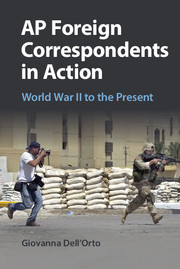Book contents
- Frontmatter
- Dedication
- Contents
- List of Figures
- Acknowledgments
- 1 Introduction
- 2 Getting Ready, Getting Started, and Getting Lost in Translation
- 3 What's the Story? News Judgment, News Pitches
- 4 Getting to the Sources (and Keeping Them Alive)
- 5 Being an American Abroad – Perceptions of Journalists
- 6 Eyewitness Reporting: Getting to the Scene
- 7 The Costs of Being There to Count the Bodies
- 8 Your Byline Today, Mine Tomorrow: Teamwork and Competition
- 9 Access, Censorship, and Spin: Relating with Foreign Governments
- 10 Flacks, Spooks, GIs, and Objective Journalists: Relating with the U.S. Government Abroad
- 11 Getting It Out, Getting It Edited: Filing News, Working with the Desk
- 12 The Evolving Milkmen: Writing for an Audience
- 13 Purpose and Influence of Foreign Correspondence
- 14 Eight Decades of Bearing Witness and Telling the World's Stories: Conclusions
- Bibliography
- Index
7 - The Costs of Being There to Count the Bodies
Published online by Cambridge University Press: 05 November 2015
- Frontmatter
- Dedication
- Contents
- List of Figures
- Acknowledgments
- 1 Introduction
- 2 Getting Ready, Getting Started, and Getting Lost in Translation
- 3 What's the Story? News Judgment, News Pitches
- 4 Getting to the Sources (and Keeping Them Alive)
- 5 Being an American Abroad – Perceptions of Journalists
- 6 Eyewitness Reporting: Getting to the Scene
- 7 The Costs of Being There to Count the Bodies
- 8 Your Byline Today, Mine Tomorrow: Teamwork and Competition
- 9 Access, Censorship, and Spin: Relating with Foreign Governments
- 10 Flacks, Spooks, GIs, and Objective Journalists: Relating with the U.S. Government Abroad
- 11 Getting It Out, Getting It Edited: Filing News, Working with the Desk
- 12 The Evolving Milkmen: Writing for an Audience
- 13 Purpose and Influence of Foreign Correspondence
- 14 Eight Decades of Bearing Witness and Telling the World's Stories: Conclusions
- Bibliography
- Index
Summary
I got my turn, filed my story [on anti-Ceaușescu demonstrations in Timișoara, Romania] to our Vienna office, and talked to my colleague there, who told me that they had had reports of more gunfire in the city, and I said, “Well, I have been inside, but I haven't heard much – but I'll go out and check.” [chuckles] And then I did leave [the Yugoslav consulate, where journalists were filing stories on the single operating line] and … there was a shooting around us. And I fled with my Yugoslav colleague and spent some time trying to make my way back to our hotel, but most of the streets were blocked by pretty heavy fighting. And at one point I felt compelled to double back and I came on a checkpoint, and at the checkpoint the people across the street opened fire on our car and I was shot. … Obviously a lot of these stories are dangerous, but it is what we do. It's not unlike being a law officer or a member of the military, where you know that there's a possibility that in the course of doing your job you could suffer injury or death. But it is also the calling to try to bear witness to what's happening in the world. We always say, and we mean it, that no story is worth dying for. And that we won't take unreasonable risk. But we will take what we regard as reasonable risk in trying to tell a story. … [J]ournalists may be putting themselves in danger, but the danger they expose themselves to is usually much less than the people who are living in those places face … and sometimes it feels like the very least the journalist can do, if those populations are facing those dangers, is to be there to show it and to tell people about it. Because otherwise they're going to be killed or massacred or subjected to bombing or put in jail and no one's going to hear about it, and then we're really in a sad state.
- Type
- Chapter
- Information
- AP Foreign Correspondents in ActionWorld War II to the Present, pp. 187 - 215Publisher: Cambridge University PressPrint publication year: 2015



